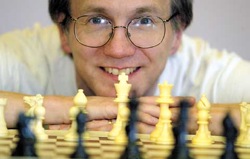Yesterday the San Jose Mercury News, which is Steven Zierk’s home-town newspaper (he lives in Los Gatos, a suburb of San Jose) published a very extensive article about his triumph in the world under-18 chess championship. I urge you all to read it!
I think one of the most interesting things about Steven’s chess career is that after a great early start, he actually gave up the game for about five years. That must have been from about the time he was 9 to 14. His example proves that kids should be allowed to decide for themselves what extracurricular interests they want to pursue, and how hard they want to pursue them. Once he decided for himself that he cared about chess, he was able to make up completely for the “lost years” — which of course were not lost, because during that time he had grown and matured.
Steven still seems to put chess in perspective, and realizes that it isn’t necessarily the best career. Even though he can have a chess scholarship to the University of Texas at Dallas if he wants it, he is also considering the more traditional and academically well-rounded schools like MIT, Princeton, Duke, and Cornell.
I wrote a letter to the editor of the Mercury News yesterday, which was published in today’s paper. It’s very short (they have a word count limit of 125 words) and nothing I wrote will be very new to readers of this blog, but I hope that it might make some newspaper readers aware of the chess renaissance in our area. Here is what I wrote:
I would like to salute the Bay Area’s two world champions: the San Francisco Giants and Steven Zierk, who last week won the world under-18 chess championship (page B1, Nov. 2). Steven is a classy guy who plays chess with the passion of a kid and the aplomb of a grown-up. He is great at coming from behind, as he did in the world championship.
Steven is the third Bay Area kid to win a world chess championship in recent years, following Daniel Naroditsky (2007, under-12) and Sam Shankland (2008, under-18). This testifies to the excellent scholastic chess programs in the Bay Area, and it proves that Americans can compete with the world in mental challenges as well as in physical ones.
Congratulations again, Steven! And congratulations to Michael Aigner, Steven’s coach! Let’s hope that we will continue to produce great chess players and great sportsmen.


